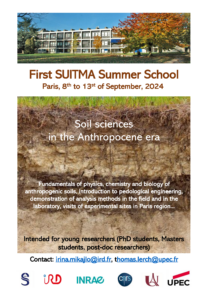
Thesis defense of Youssef YACINE – « Eco-evolutionary dynamics of mutualistic-antagonistic systems Implications for plant-pollinator-herbivore communities »
« Eco-evolutionary dynamics of mutualistic-antagonistic systems
Implications for plant-pollinator-herbivore communities »
Abstract: Ecological communities consist of multiple species interacting in diverse ways. Yet, the diversity of
ecological interactions has often been ignored as most studies focus on a single type – antagonism, mutualism,
or competition – of interaction. Studies of communities combining several interaction kinds should significantly
improve our understanding of the mechanisms supporting biodiversity in natural communities because (1) most
species get simultaneously involved in a diversity of interaction networks, and (2) the eco-evolutionary
processes within such communities may differ from the linear combination of the processes at play within
single-interaction-type communities. Playing a key role in the functioning of terrestrial ecosystems, plant-
pollinator-herbivore communities are in addition crucial for agricultural production. Moreover, a large number
of empirical studies documents the complex coevolutionary dynamics that may arise from the interplay of
pollination and herbivory. At the core of the present PhD thesis, studying the eco-evolutionary dynamics of
plant-pollinator-herbivore communities is thus of high applied relevance while offering the opportunity to gain
new conceptual insights into the functioning of mutualistic-antagonistic communities. We formulate a model describing the population dynamics of a plant-pollinator-herbivore
community in which the strengths of plant-animal interactions depend on the trait-matching between plant and
animal phenotypes. When evolution is not accounted for, we show that stable coexistence requires a balance
between the strengths of pollination and herbivory. When evolution is accounted for, we show that the
diversification of the plant phenotype may arise from the interplay of pollination and herbivory. This result is
particularly important as several empirical works report the role of such an interplay in the maintenance of plant
polymorphism. Studying animal evolution, we show that pollinator evolution fosters competitive exclusion
among plant species, while herbivore evolution favors the maintenance of a diverse plant community. We also
find that coevolutionary dynamics may significantly differ from the dynamics arising from the sole evolution of
one animal species. All in all, our work shed light on several key mechanisms underlying the eco-evolutionary dynamics of
mutualistic-antagonistic communities, plant-pollinator-herbivore in particular. For instance, our results unravel
two distinct processes that could explain the ubiquity of shared pollinator and herbivore preferences for plant
phenotypes. But first and foremost, our study advocates in favor of accounting for both evolution and the
multispecies community context in which species are embedded to better grasp the processes supporting
biodiversity in natural ecosystems.
Keywords: pollination, herbivory, multispecies coexistence, diversification, eco-evolutionary feedback, adaptive
dynamics, evolutionary rescue
- Orateur: Youssef YACINE,
- Laboratoire: iEES Paris
- Mail de l'orateur: youssef.yacine@polytechnique.edu
-
résumé:
Code : c5CCDi
- Inscription: https://zoom.us/j/92382028828?pwd=d2prV2NLdWJrYUdXYk9rMUdBNituUT09




